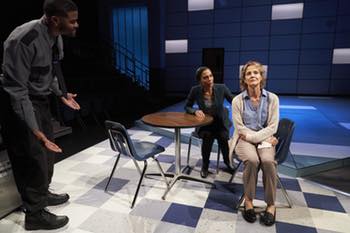THEATER REVIEW: “Pipeline” @ Cleveland Play House by Laura Kennelly

Through Sun 11/3
Dominique Morisseau’s Pipeline, now at the Cleveland Play House’s Outcalt Theatre, looks at today’s world and doesn’t like what it sees. Director Steve H. Broadnax III and an outstanding cast show a quick-changing social scene propelled by a clash between ideals and the fragile humans who must live up to them.
The strong-willed Nya (Suzette Azariah Gunn) teaches in the inner city. It’s a dangerous place to work, one where students attack each other and their teachers. Early on we see just how dangerous when we meet Nya’s fellow teacher, the fragile and dedicated Laurie (Rachel Harker). Laurie has just returned to teaching after being seriously injured during an outbreak of in-school violence.
Her friend Nya feels she’s needed in the school, but refuses to send her son Omari (a conflicted Kadeem Ali Harris) there and insists he go to an exclusive upstate boarding school. It’s a place foreign to him. He resents that others there assume things about him just because he’s African-American. Despite the consideration and kindness shown to him by fellow student, Jasmine (a winning Jade Radford), he’s depressed and very angry.

Now, add to that mix the men in Nya’s life. She and Omari’s father Xavier (a commandingly distinguished and very angry Bjorn DuPaty) live apart. We see her spurn fellow worker Dun (Eric Robinson) so it seems that whatever might have happened between them that made Xavier jealous is in the past.
When Omari pushes a teacher in boarding school, Nya feels overwhelmed with fear (and guilt). She worries that her son is doomed, like so many others his age, to move into the “pipeline” that funnels young black men into reform school and then serious crime and then prison.
It’s a strangely paced production, with monologues and dramatic exchanges (sometimes with long pauses) on the set interspersed with videos of chaos in school hallway shown on a large screen behind the stage. Often, what should be intimate — the talk between loved ones — moves too quickly from one trauma to another. The stage’s rising center platform doesn’t always retract fast enough, so we have, for example, a bed in the middle of the stage slowly sinking while a new scene set elsewhere begins.

BOTTOM LINE: Despite a good effort by the talented Cleveland Play House team, it’s not enough to smooth over distracting dramatic elements inherent in the play itself. Pipeline tries to cover too many important social topics — public and private education, divorce, single parents, social reform — all at once. It takes a village to make a mess? I don’t think that’s what the playwright had in mind, but that seems to be what she shows us. Morisseau, a MacArthur Foundation Genius Grant awardee for 2018, offers 90 minutes of pain about marriage, schools, responsibility and assumptions.
No comments:
Post a Comment